
Section Branding
Header Content
Deluxe: Racial Unity Brings a Small Town Back to Life
Primary Content
Salvation South Deluxe is a series of extended episodes of the Salvation South podcast that unravel the untold stories of the Southern experience, narrated by the authentic voices that make this region truly unique. In our first episode, host Chuck Reece takes you to Old Fort, North Carolina, where the power of unity has rebuilt a thriving economy for this small Southern town.

TRANSCRIPT:
Lavita Logan: Yeah, we was about two seconds from seeing tumbleweeds rolling down the street.
Stephanie Swepson-Twitty: We went from being a relatively vibrant economy to a community where we were almost a dustbin.
Chuck Reece: Welcome to Old Fort, North Carolina. It's a two-stoplight mountain town about 25 miles east of Asheville in the Pisgah National Forest. Population 815. Old Fort is truly a town that almost died, that almost went in the dustbin, that almost had tumbleweeds rolling down Main Street. Well, it would have if tumbleweeds grew in Appalachia. Like many small mountain towns in the area, Old Fort once thrived, thanks to textile mills and furniture plants, before cheap overseas labor destroyed blue-collar jobs across the South. But a few years later, in the mid-teens, something amazing started happening. People in Old Fort decided to rebuild their town's economy by capitalizing on a natural asset that no one could take away: the Pisgah National Forest itself.
Wendy Lewis: This area is just so beautiful. Once people get here, then there's something more.
Chuck Reece: Community groups came together and sketched out a network of hiking and mountain biking trails — 42 miles' worth — that would run through the Pisgah Forest, connecting Old Fort to one of western North Carolina's most reliable tourist attractions, the magnificent Blue Ridge Parkway. And this was not a plan hatched by just one group of citizens. Old Fort historically has been a diverse community. And in an example of something that too rarely happens in small Southern towns, Black groups and white groups reached across the old racial barriers to plan their future together.
Stephanie Swepson-Twitty: The community is over 100 years old, with properties held and owned by — by communities of color.
Chuck Reece: And their work is paying off. Old Fort is getting a second chance.
Patrick Ellis: Old Fort is coming to life.
Chuck Reece: I'm Chuck Reece, and welcome to Salvation South Deluxe, a series of in-depth pieces that we're adding to our podcast feed, where we will bring you deeper stories about Southerners who reach across the barriers of culture and color that once divided us.
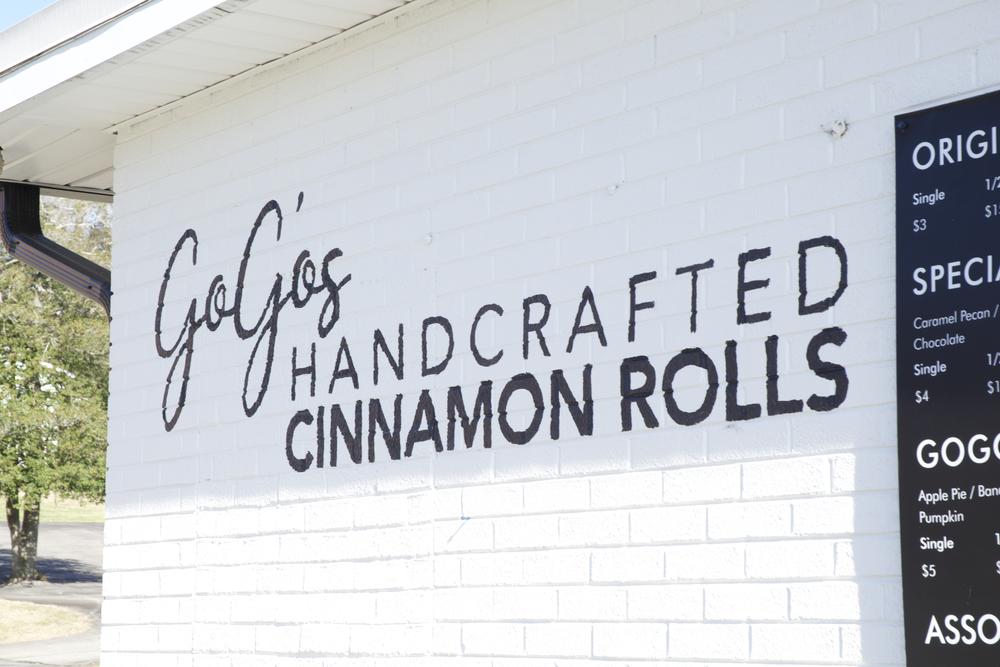
Chuck Reece (on tape): Where's the stuff that goes in the coffee?
Wendy Lewis: Right here honey, around the corner.
Chuck Reece: Even though only the first 6 miles of Old Fort's planned 42-mile trail network are completed, hikers and mountain bikers are already coming to town by the hundreds every weekend. On a Friday morning, my wife, Stacy, and I are inside Gogo's Cinammon Rolls, just one business that has sprung up to serve those visitors. Jerry and Wendy Lewis opened Gogo's in early 2022.
Chuck Reece: Jerry, I swear this is one of the best things I've ever put in my mouth.
Jerry Lewis: You can thank my wife right there for that.
Chuck Reece: I went plum gaga for Gogo's apple pie cinnamon roll. Folks crowd in every morning for Wendy's freshly baked takes on the classic cinnamon roll. Her array of flavors is astonishing: Maple bacon — mmm, bacon. Caramel pecan. Orange creamsicle. Birthday cake. Peanut butter. Now the roots of their business run back to 2020 during the beginning of the COVID-19 pandemic. In May of that year, Wendy found herself furloughed from her job at a college cafeteria with not a lot of prospects.
Wendy Lewis: I was honestly really anxious because I didn't know what I was going to do. Jerry and I talked about it, prayed about it, and he's like, "You should bake some." The first couple of times was just awful, you know, like this is not going to work. And so finally I got it down pat and then we put a post out on Facebook and people started ordering through Facebook. And honestly, it was word of mouth.
Chuck Reece: People came to pick up their cinnamon rolls at Jerry and Wendy's house, the same house where Wendy grew up, being taught how to cook by her beloved grandmother, whose nickname was, you guessed it, "Gogo." Two years later, they opened the doors of their storefront just a short walk away from that house. Miss Gogo's spirit lives on in that sweet-smelling kitchen, and Gogo sells out of its inventory nearly every day. Wendy has lived in Old Fort her entire life, and she's seen it go through many changes over the years.
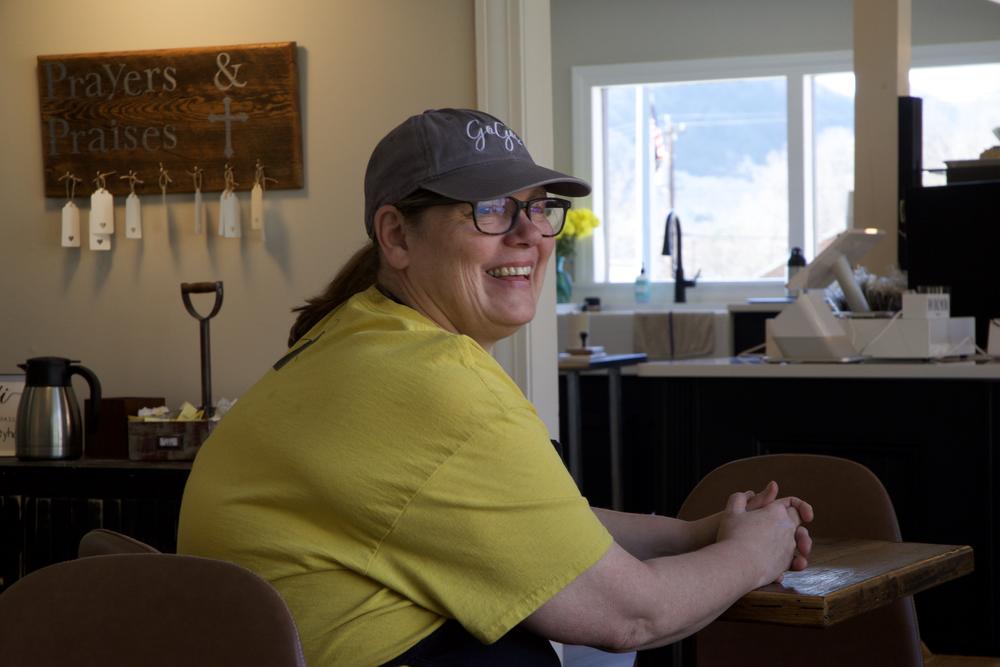
Wendy Lewis: My Gogo actually worked at Ethan Allen, the furniture factory, and I did too at some point. When Ethan Allen was open and Old Fort Finish was open, it was like a really little thriving town. But once those things started closing down, of course, people had to go to other places to find jobs. And it really became this really — I wouldn't say a ghost town, but it was like a — it was like we were on pause. Like something needs to happen. But what's going to happen?
Chuck Reece: Let's rewind back to that time Wendy is talking about, the mid-teens, and introduce you to the people who would become four of the key players in Old Fort's ongoing turnaround. This is Stephanie Swepson Twitty, a lifelong resident of Old Fort, who is the CEO of a nonprofit called Eagle Market Streets Development Corporation. Eagle Market promotes economic equity across North Carolina by investing in real estate and Black-owned small businesses. Stephanie remembers the days in the late 20th century when a huge textile mill owned by United Merchant and a furniture plant owned by Ethan Allen kept her hometown thriving.
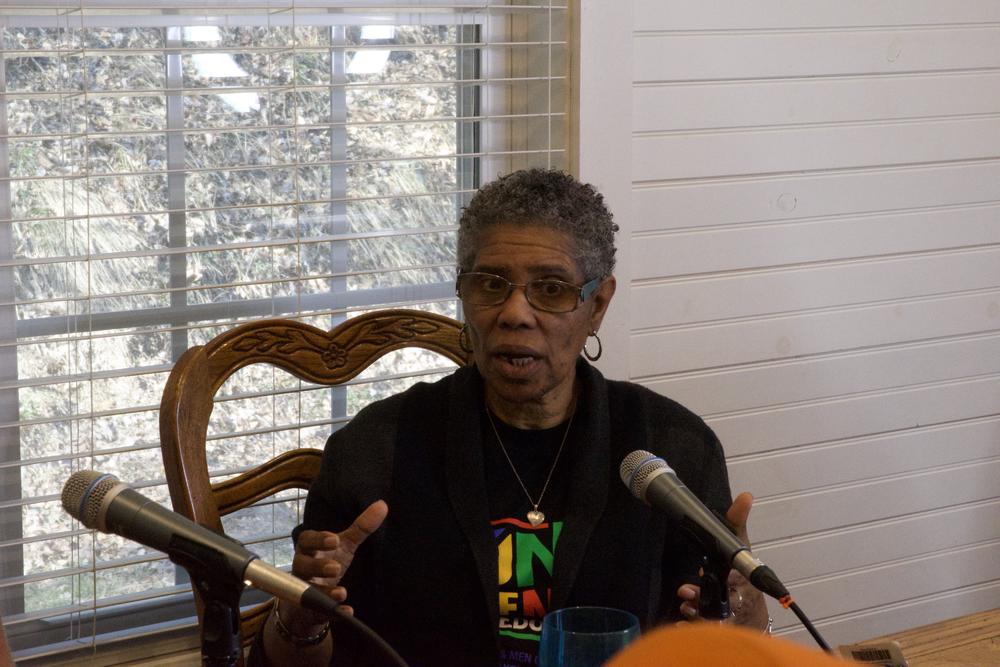
Stephanie Swepson-Twitty: We went from being a relatively vibrant economy where people could work, live and get services in the community that they lived in, to a community where we were almost a — a dustbin. I mean, nothing was happening in Old Fort except the people who had residences here holding on to — to those properties.
Chuck Reece: That's when Lavita Logan began worrying that she would soon see the tumbleweeds rolling down Main Street. Now, Lavita was instrumental in forming a group called People on the Move for Old Fort to advocate for the economic interests of the town's African-American community. And this is People on the Move's statement of purpose: "Although our community comprises over 30% of the population, we have been rendered invisible and excluded from decision-making spaces for generations. Our souls are in the dirt here, but that is not reflected in the dominant historical narrative of the town. The purpose of our work is to rebuild a sense of pride in our community, reclaim public spaces, and create more visibility of Black leadership in Old Fort."
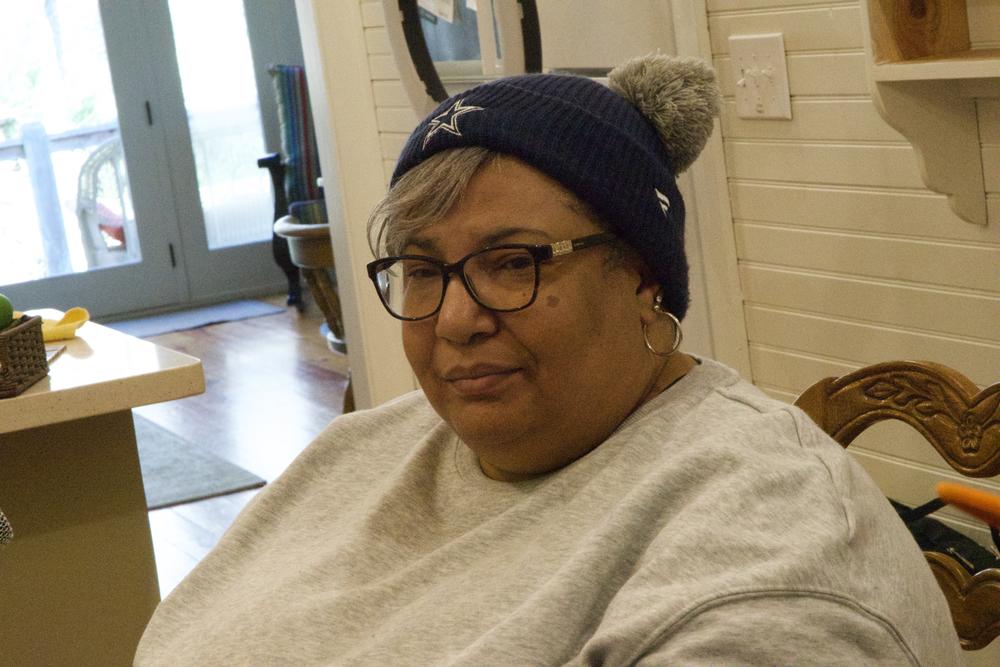
Lavita Logan: First, we started the Old Fort Community Forum, and I think it's back in 2018. We was noticing that there wasn't a lot of the Black community was coming out to these forums. We were wondering how we were going to try to get some of the Black communities out to these forums and make sure they get all the information that we're giving to everybody in the community. And so we come up with the name People on the Move for Old Fort, and we had our first meeting in October of 2018.
Chuck Reece: Unbeknownst to Lavita and Stephanie and all the other Black residents involved in those community forums, a man named Jason McDougald who ran Camp Grier, a summer getaway for young people just outside the city limits, was already hatching the idea to build this massive network of hiking and biking trails. What drove him was simple: He knew that Camp Grier could not survive if Old Fort's economy died.
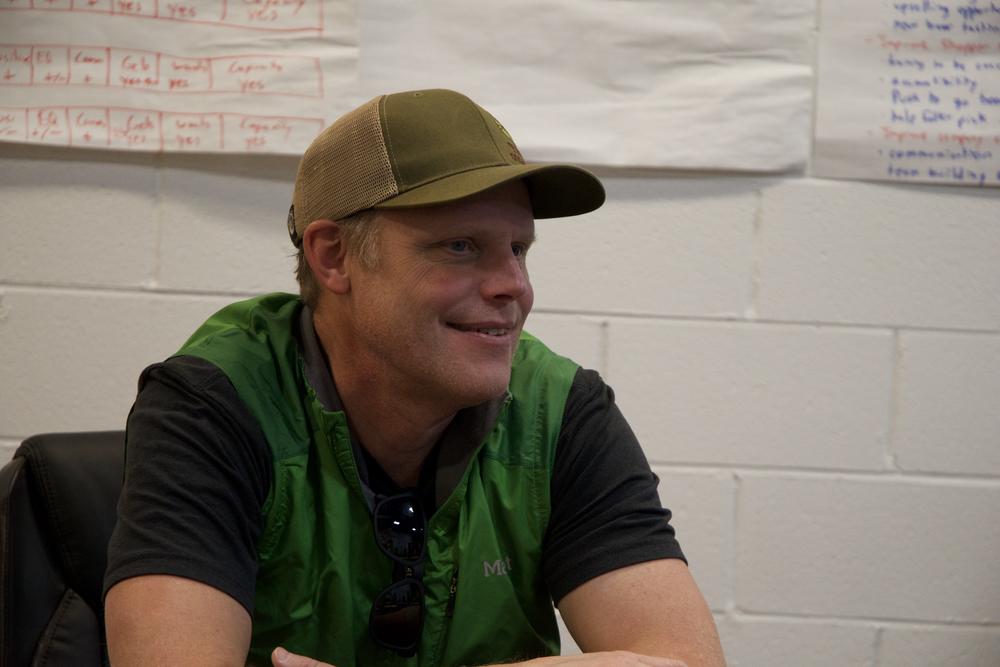
Jason McDougald: I think about 2015, you know, is kind of when I started really thinking strategically about how to make Camp secure as a nonprofit entity. And it became clear that, like the town and the camp were just tied, you know. Camp's almost the same size geographically as the town is. And so it's like, okay, in order for us to succeed, like the town really had to do better because we — we needed a reason for people to come. We needed things for people to do. And we just didn't have that.
Chuck Reece: To build new trails in the Pisgah National Forest, Jason knew he would have to work with the U.S. Forest Service, which manages all of our national forests. Jason had already been working with a forest ranger named Lisa Jennings on some projects to improve the existing trail through the forest.
Lisa Jennings: When Jason came to me, it was kind of on the tail end of — of some other collaboration we'd been doing across the district. The forest around Old Fort, like the town, was kind of dusty. There were trails that were almost completely grown over. There weren't people in the community who were really invested in the trail system and there was nobody out there really maintaining it. We very much rely on our community and our volunteers to — to keep up the trails around those communities. And so when Jason first came to me with an idea to build a new trail, I think my response was, "Let's back up a minute because we have to maintain what we have first."
Chuck Reece: So the Camp Grier team went to work, helping Lisa Jennings and the Forest Service maintain the trails that already existed. And as the months passed, they sketched out a plan to build a much larger network of trails. In 2019, they went public, presenting their plan to a meeting of the Old Fort Community Forum. And that's what brought them into the sandbox with Lavita Logan and Stephanie Swepson-Twitty.
Stephanie Swepson-Twitty: I really think that what sparked, as we often talk about the four of us, the secret sauce. It was people trusting each other even though they could not see 20 years down the path to the discussion they were having. They trusted in that moment that that relationship was meant to be, that — that something powerful and integral could come from giving Camp an opportunity to be there, to present giving People on the Move an opportunity to bring it back to the core group, which is pretty much what Lavita did. She said, You know, "This guy showed up; Camp showed up and and had this discussion with us." Many of us around that People on the Move table in that core group were equally committed to having a new model for how community works together; so that it isn't top-down driven, it's bottom-up.
Chuck Reece: Of course, this new model for how the Old Fort community would work together did not instantly spring into glorious life because of that one meeting. But the work Stephanie, Lavita, Jason and Lisa embarked on together cemented their bond over time. After that 2019 meeting at the community forum, two big tasks lay ahead of them. First, they had to form a nonprofit organization to spearhead the trail-building project. And second — and this was a big one — they had to find the money to do the environmental impact study that the federal government requires for any project that happens on federal land such as the Pisgah National Forest. The nonprofit they formed in partnership with the National Forest Service was called the G5 Trail Collective. When the G5 Collective got up and running, they approached Lavita Logan's group, People on the Move for Old Fort, and asked for grant money to help fund the environmental study. And when the study got underway, they found that it would actually be possible to build even more trails than they originally envisioned.
Jason McDougald: When they stepped up to fund our environmental studies for the trail project, the number of trails that we were going to build expanded.
Chuck Reece: That broader vision gave the project even broader appeal. And at that point, the Old Fort government stepped up to put $21,000 in taxpayer money to turn the G5 Collective's ideas into reality. Now, here's where it gets even more interesting. Just this year, a nonprofit called the Dogwood Health Trust Fund awarded the G5 Trail Collective $490,000 to the trails project. That investment in Old Fort's renewal gave the team the boost they needed to expand their funding pool even further.
Stephanie Swepson-Twitty: Once Dogwood saw that this was a much bigger lift than the trust could handle, we started to think about a way to do systems change and to change the landscape around how the state and the fed work together, that that this would be a real opportunity for that.
Chuck Reece: As luck would have it, on the 50th anniversary of the North Carolina Trail System Act, the state of North Carolina designated 2023 the Year of the Trail. The Great Trail State Coalition, a broad group of diverse organizations, agencies and other supporters who advocate for more state investment in the trail system, was awarded $25 million. And the G5 Trail Collective, which at this point included People on the Move for Old Fort Stephanie's Eagle Market Street Development Corporation and even the University of North Carolina at Chapel Hill applied to the Great Trail State Coalition for a grant, and they were awarded $2.5 million. And just like that, the Old Fort Trails Project was funded. Here's Lisa Jennings.
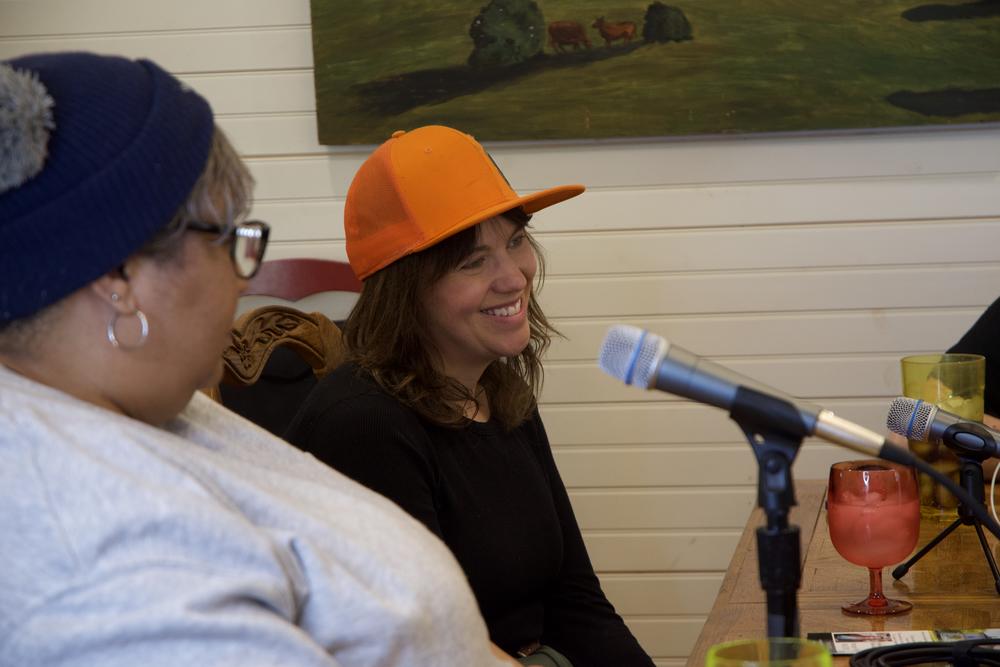
Lisa Jennings: That speaks to the importance of that money from People on the Move. Like, the first dollars are the hardest one, and especially something as unattractive as environmental assessments that, you know, it's like the preplanning. And so, you know, having that trust and that support and that risk that People on the Move took in the project when it was just a crazy idea is what has led the town to believe in it. Because when you see everybody jumping on and you see the momentum, everybody wants to be part of it once it gets to that feel good moment. It won't get there without the grassroots effort, right?
Chuck Reece: The new money from the state of North Carolina changed the timeline and scope of the trails project significantly.
Lisa Jennings: We had been building about 6 miles of new trail per year. And with this funding and the timeline of two years, we're looking at 12 to 15 miles of trail a year. It's now reasonable that we could be fully complete with this project, say, by 2026.
Chuck Reece: 2026. That's three years earlier than the G5 Trail Collective planned for when they began this project. It's truly amazing what people can do when they come together. So far, 11 locally owned businesses have opened in downtown Old Fort that served the cyclists and the hikers who use the new trails — and the natives. Dogwood Health Trust Fund, the same nonprofit that awarded the G5 Trail Collective $490,000 for the Trails Project, also awarded a grant to Stephanie's Eagle Market Street Development Corporation so they could purchase a space in Old Fort, where small businesses can get started. An incubator, as the economic development folks call it. It's called the Catawba Vale Innovation Market, a 60,000-square-foot facility that will feature, among other things, a state-of-the-art film studio, space for small manufacturing operations and subsidized office spaces for small businesses. The story of Old Fort's economy is literally being rewritten. The old story hinged on one, sometimes two dominant industries like furniture and textiles. As the new story comes together, its architects want to avoid that kind of dependence. Their goal instead is to create a blended economy based on various sources of income so it will last. Stephanie explains.
Stephanie Swepson-Twitty: When Old Fort was a timber town, it was single-focused as an economy. When we look at the manufacturing, we were the king, if you will, of manufacturing here. It was single-focused in its approach to job creation and economic development. I am suggesting that with the trails that we have a real opportunity to blend manufacturing, small business development, tourism and other opportunities to have a more blended economy so that the economy is not hinging on a single industry.
Chuck Reece: With everything they've accomplished together. It's clear that these folks really make an incredible team. And none of this could ever have happened if the Black citizens and white citizens of Old Fort, who for generations were taught not to trust each other, had not been willing to start trusting.
Stephanie Swepson-Twitty: It requires what most relationships require, which is some minimum amount of trust between the parties that want to, to your analogy, play together. You know, in order for even for us to have a cup of coffee, one's got to trust, the other one's going to show up, that we're going to be able to have that cup of coffee and not end up throwing it on each other or whatever, you know? And I'm making some really base analogies here, but I feel like it's that simple and that complicated.
Lisa Jennings: We talk a lot about the trust and how we built that trust was really just relationship-based and time and talking and realizing that we all had these common goals and common interests and common ways that we wanted to see the future not just in Old Fort, but in how we collaborate and play together in that space. We're not competing with each other's interests. We're collaborating together in a way that's really complementary. We're going after the same thing together but in different ways. It's really teamwork, right? That make our team really great.
Chuck Reece: Old Fort, North Carolina, represents Black and white Southerners and a small town collaborating with each other, building things together, creating opportunities for each other. This is happening in the kind of place where, for so many years, Black folks and white folks didn't even see each other. Here's Lavita Logan.
Stephanie Swepson-Twitty: That's one reason why we did form People on the Move so we can have our voices heard. Like Stephanie, I always say that we lived in the polite South, that we, you know, we go to town with each other, we post office and bank, but we're not really together. I was talking to this lady one time: Her husband worked in Old Fort and she's from Boone. And she told her husband, there's not any Black people that live in Old Fort. And he's like, yes, there he is. And we make up 30% of the population. But you really don't see us out here that much. People on the Move, we wanted to change that. We want to make sure that everybody know there are Black people that live in Old Fort. And we are very vocal.
Chuck Reece: That lady from the bank, I think she might listen to this episode five years from now and ask yourself, "Why did I ever think that?" This is Patrick Ellis, one of the five commissioners of McDowell County, where the town of Old Fort sits.
Patrick Ellis: Old Fort is coming to life. There's a couple of breweries here in town. There's some smaller businesses coming to town. In McDowell, there's some more manufacturers coming. So we're looking positively as far as growth here in the county and in Old Fort.
Chuck Reece: Over at Gogo's Cinammon Rolls, Wendy Lewis shares Commissioner Ellis's assessment.
Chuck Reece (on tape): Do y'all see hikers and bicyclists and the like?
Wendy Lewis: Oh yeah, yeah, we see a lot of 'em come through. Actually, we had two guys who flew down here just to do these trails. It brings people for sure and I think, you know, make it more vibrant here with the new businesses open. I just think that this area is just so beautiful. Once people get here, then there's something more.
Chuck Reece (on tape): If you want to get a sense of the new bustling Old Fort, then you want to visit Hillman Beer, a family owned beer-making business which opened a brewery and a brewpub in downtown Old Fort in 2020. The company started up in Asheville in 2017, then chose Old Fort to start up its second operation. Now on any given night, local folks and visitors crowd the brewpub to chow down on fat sandwiches, and they choose from a menu of about 20 different beers, all of them brewed right there. We went to talk to one of the three owners, Brandi Hillman, late one morning, just before the lunch rush began.
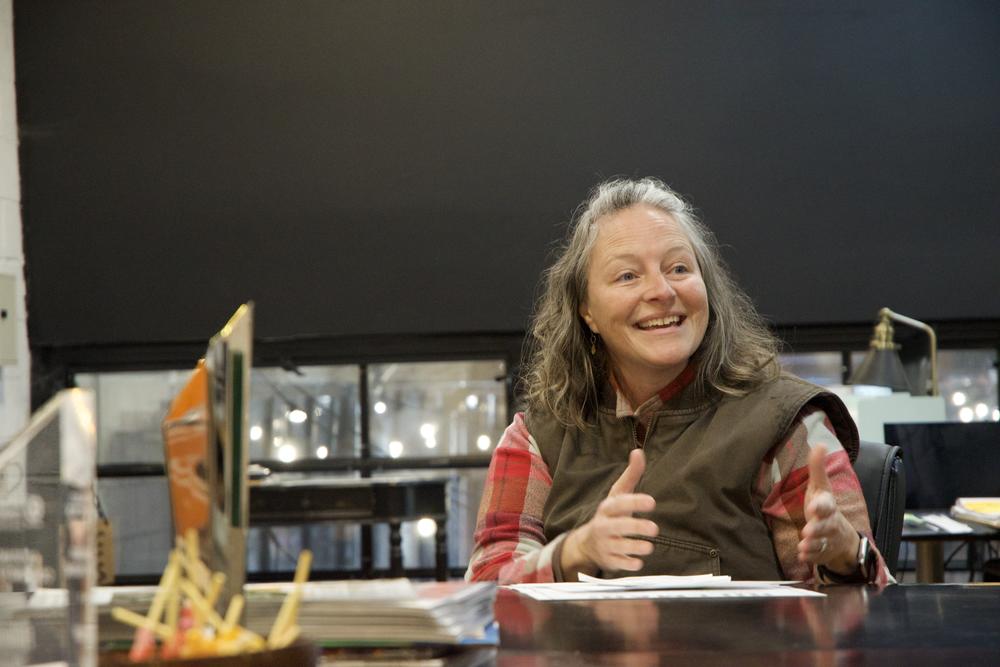
Chuck Reece (on tape): Y'all didn't start in Old Fort, right?
Brandi Hillman: No, Asheville is our first location. I grew up an hour west of Asheville. I'm a local gal. Old Fort was known as, you drove through to get to Boone. You'll hear people say like, I've never really stopped. I've always either stopped and got gas on the highway and then hopped right back on or drove through just to get from, you know, Asheville to Boone. We could see the potential and what can happen to Old Fort. The proximity to 40, its proximity to Asheville and Charlotte. The trails, the forest, Lake James, Catawba Falls. Outdoor enthusiasts, those folks have a natural interest in craft beer. So immediately it was a natural fit of like-minded folks who play really hard on the trail. But, you know, go have good craft beer at the end of it. So, we didn't know the extent of what was coming, but we just knew the potential of Old Fort.
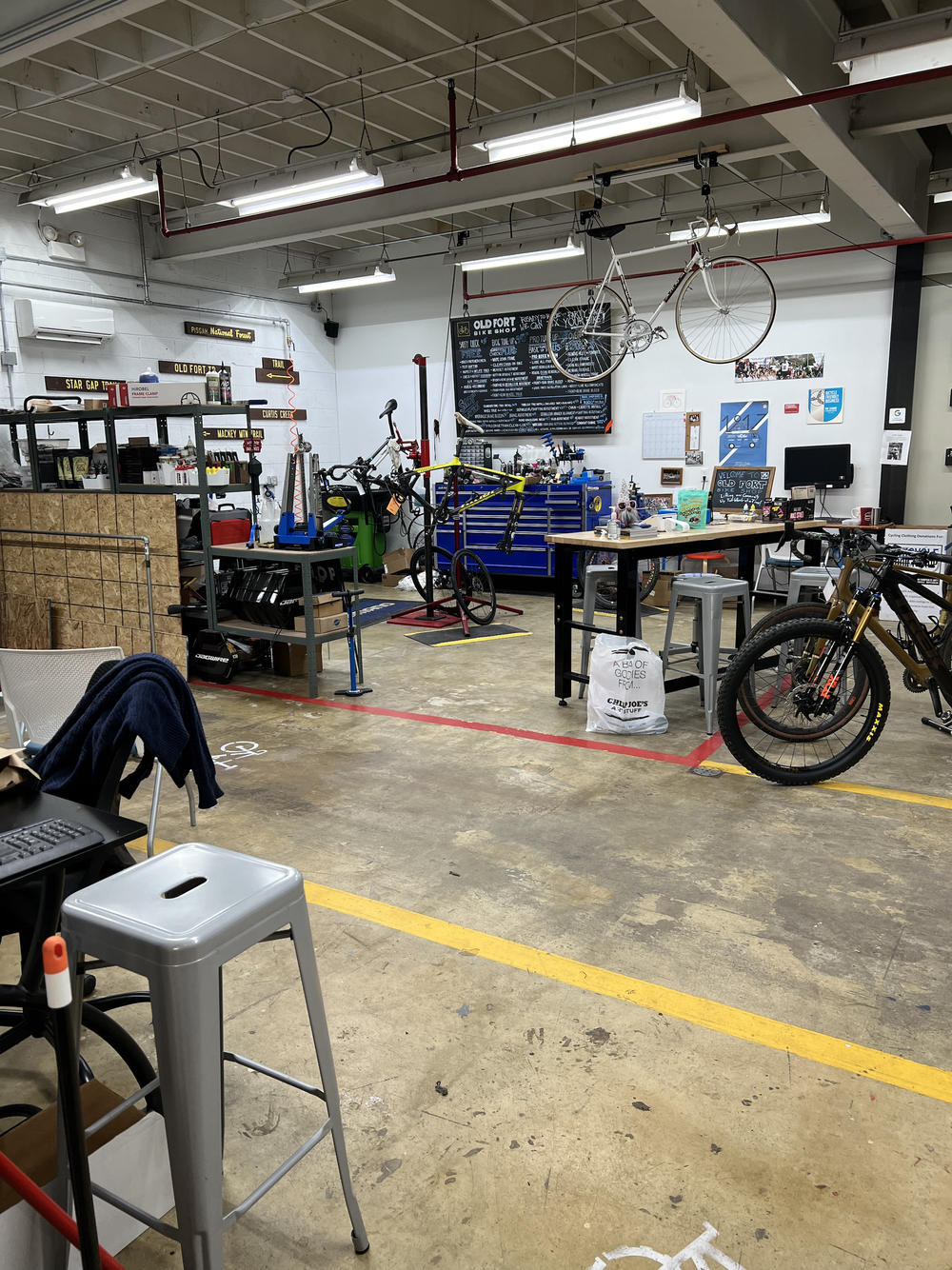
Chuck Reece: Outdoor folks, like mountain bikers, have a taste for good beer: brews that are adventurous like the cyclists themselves. And what else do mountain bikers need? Bike repairs and cycling gear. That's where the Old Fort Bike Shop comes in. The shop is owned and operated by Chad Schoenauer, a rock-and-roll character who's been working on bikes for decades.
Chad Schonauer: Whether it is a entry-level bike or the $10,000-plus super bike, I work on at all.
Chuck Reece: On Saturday morning, when we visit Chad, a few dozen trail enthusiasts are gathering around his shop, volunteering for a morning session of trail maintenance work. They're from Old Fort and, from an Asheville group of women, mountain bikers who call themselves Skirts in the Dirt.
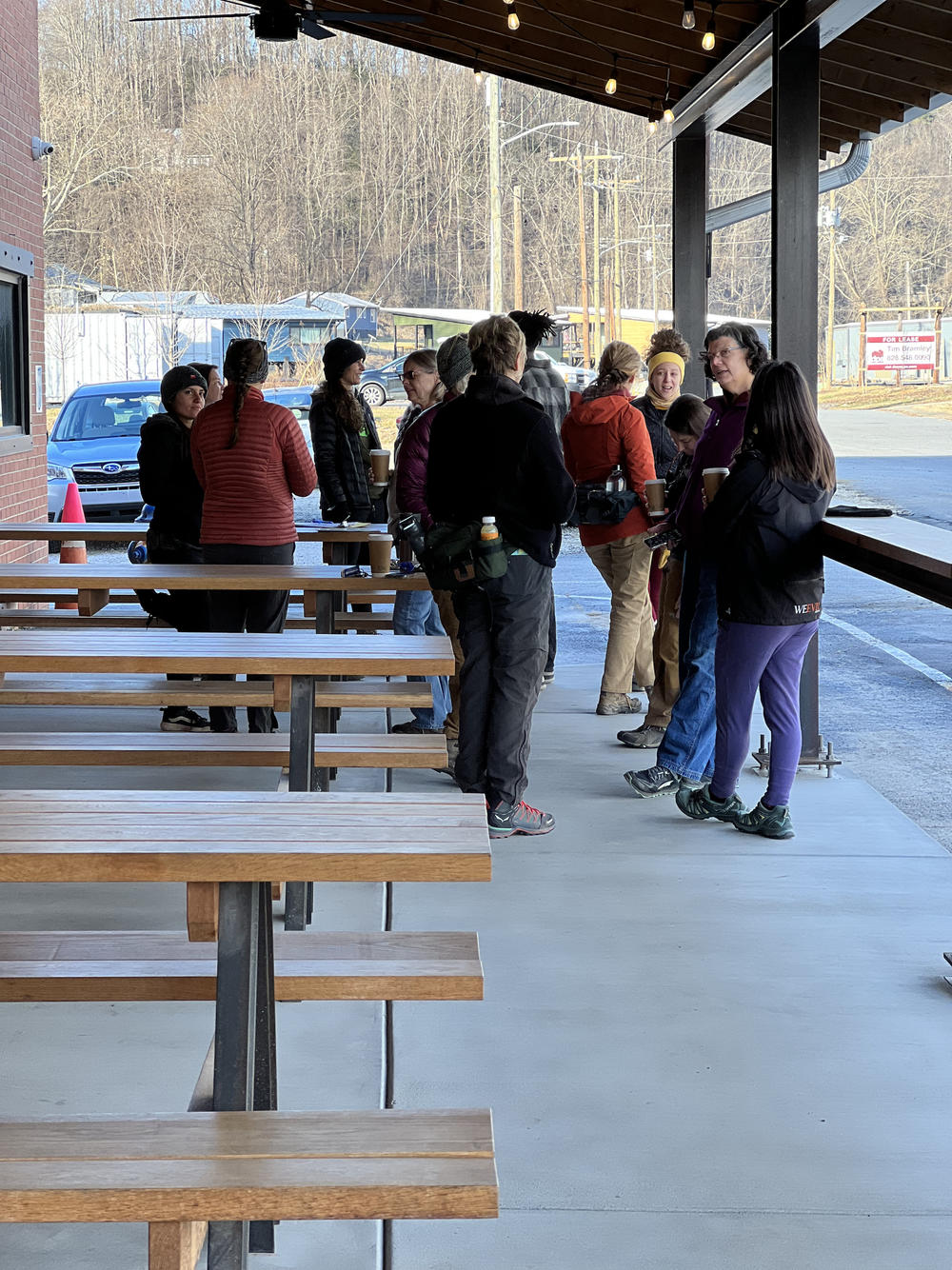
Chad Schonauer: What's going on this morning is the G5 Trail Collective and the Dirt Skirts group from Asheville has signed up and booked, completely, all of the volunteer spots to do trail work today. So it's a wonderful problem to have when you have to say, "Oh, sorry, we have too many volunteers." Every little bit counts and it just brings the trails up and then brings the town up because people come to ride and also participate in big events. Off Road Assault on Mt. Mitchell is a very big deal, and that happens out of Old Fort here, too. I think one of the biggest draws to the trail system here has been the publicity that we get off of YouTube. A lot of people are doing videos of favorite trails and Kitsuma — if you just search that on YouTube, there will be absolutely dozens of people from all over the country that come here to ride that one trail. It's a bucket list trail.
Chuck Reece: And the cyclists who were already coming to Old Fort to ride the Kitsuma Trail are now flocking to the new trails built by the collective. We visited the Gateway trailhead to talk to some mountain bikers.
Biker #1: It was really just gravel before and they come in and did all the work. Now it's super flowy, smooth. They've done a really good job.
Biker #2: It's very good trails. It's good setups, easy ride up to the top, ride down the mountain's descents. Good views. Very enjoyable.
Chuck Reece: Six miles of trails are already open. The original plan was to expand that to 42 miles by 2029, but with this year's influx of money, they'll now have the trail network completed three years earlier in 2026. But even with just the first 6 miles ready for action, hikers and bikers are showing up every weekend, even in the wintertime. And the locally owned businesses we visited, plus others, have more customers as a result. That's all good news, and the Old Fort story could end right there. But from the beginning, the Old Fort community leaders were actually thinking bigger. They didn't want to repeat the patterns they'd seen in other mountain towns where affluent, outdoorsy transplants send living costs skyward, pricing out the natives. So they set out to factor housing into the long-term planning — and not just affordable housing, but equitable housing. They wanted to make sure that Old Fort stayed within the economic reach of Black and white citizens alike. Their first move was to buy up land in Old Fort's historically Black areas.
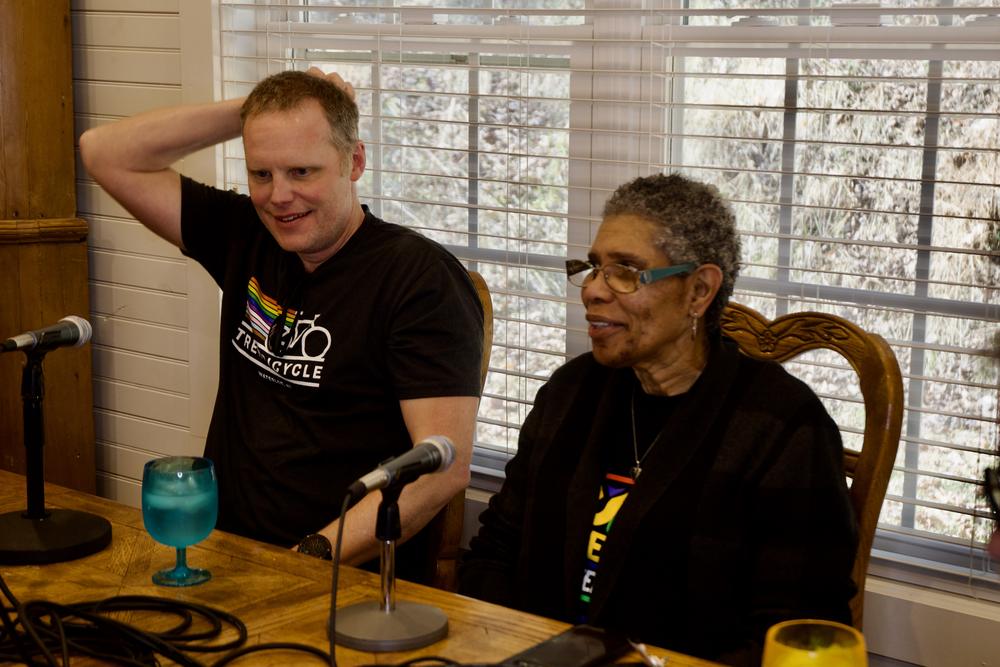
Stephanie Swepson-Twitty: It came onto the radar of community that the properties were at tax auction. Lavita brought it to People on the Move. Jason and I heard that the bid on the pieces of property had been upset and we almost immediately said together, "Oh, that can't be." We can't let that happen because the community is over 100 years old with properties held in and owned by by a community of color. And we know that if this happens, that's over. Jason, as a wonderful partner and ally, said "Well, let me make a call." And a local angel investor said, "That sounds like something I can do." He agreed to continue to bid until until he won the bid.
Chuck Reece: Here's what you need to understand. In most mountain communities that are popular among outdoor enthusiasts, when undeveloped land hits the market, investors usually pounce. This is Jason.
Jason McDougald: You've got private capital that'll come in and just buy property when it comes up because they can move quickly. That's just the way it works. And so philanthropy really has a big role to play in rural communities' equity. And that's a great example. It's like, you know, you need a philanthropic partner who can act quickly to take advantage of opportunities that come up for the community so that people don't get pushed out.
Chuck Reece: In the beginning, 10 acres of land were bought at auction to set aside the site for new affordable housing. This year, they've added 8 more acres that will be developed into affordable housing by the Gateway Foundation out of nearby Marion, N.C.
Stephanie Swepson-Twitty: Community — if we look at it from the social determinants of health, where we have to have safe, affordable housing, we have to have good health care, have to have education systems that work. Our arts and culture, outdoor rec — all of that builds for us a healthy, thriving community. And so that housing piece is integral to what we need to do to make ourselves a success.
Chuck Reece: Driving home to Georgia, Stacy and I talked about how Old Fort could be a model for small towns all over the South. It's a story I think, that should inspire all of us who have a soft spots for small Southern travel. You've been listening to Salvation South Deluxe, proudly produced in cooperation with Georgia Public Broadcasting and its network of 20 stations around our state. Every Friday, we add a new 3-minute commentary about Southern stuff to our feed, and we periodically add longer stories such as the one we've just told you. I'm Chuck Reece, your host and the editor in chief of Salvation South, which you can find 24/7 and SalvationSouth.com. Our producer is the mighty Jake Cook. GPB's senior podcast producer is Jeremy Powell. And none of this could have happened without good folks like GPB's Sandy Malcolm, Ellen Reinhart and Adam Woodlief. We'll be back soon with another full-length episode of the Salvation South podcast.
For more, visit GPB.org/podcasts
------------------------
Go deeper into Old Fort:
- -Eagle Market Streets Development Corporation-
- -People on the Move for Old Fort-
- -G5 Trail Collective-
- -Camp Grier-
- -Hillman Beer-
- -Gogo's Cinammon Rolls-
- -Old Fort Bike Shop-
Salvation South editor Chuck Reece comments on Southern culture and values in a weekly segment that airs Fridays at 7:45 a.m. during Morning Edition and 4:44 p.m. during All Things Considered on GPB Radio. Salvation South Deluxe is a series of longer Salvation South episodes which tell deeper stories of the Southern experience through the unique voices that live it. You can also find them here at GPB.org/Salvation-South and wherever you get your podcasts.
Salvation South Deluxe is a series of extended episodes of the Salvation South podcast that unravel the untold stories of the Southern experience, narrated by the authentic voices that make this region truly unique. In our first episode, host Chuck Reece takes you to Old Fort, North Carolina, where the power of unity has rebuilt a thriving economy for this small Southern town.







